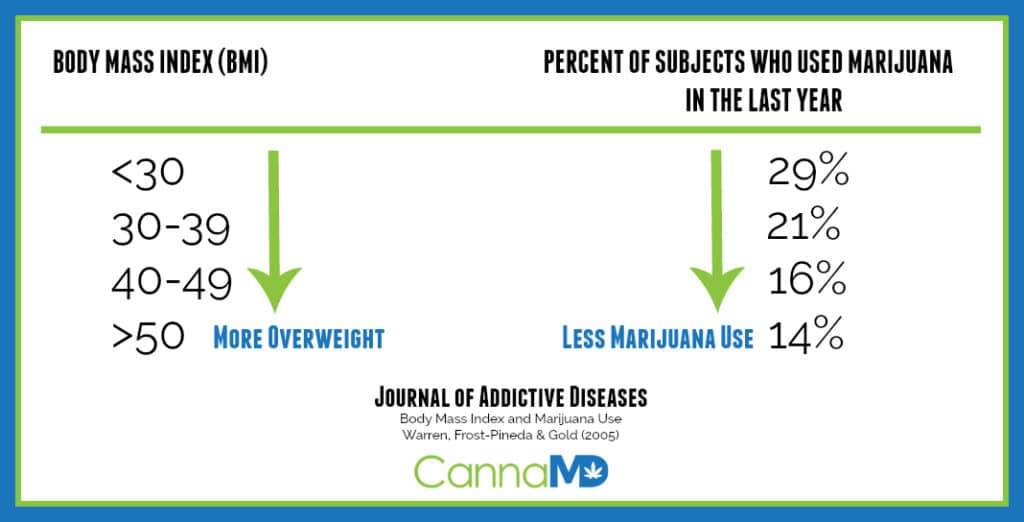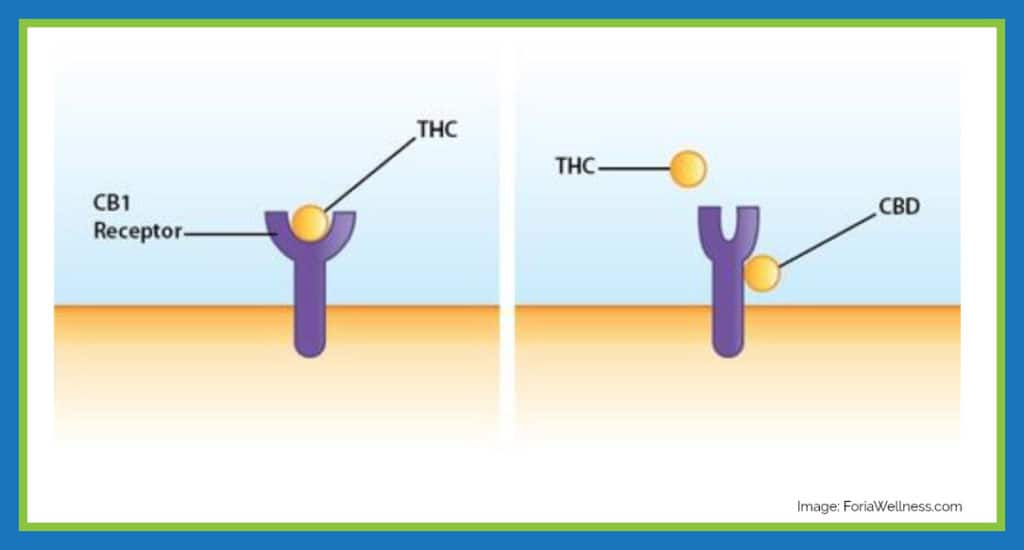While medical marijuana has gained significant recognition over the past several years for its ability to safely and effectively treat a variety of conditions, ranging from anxiety and pain to cancer and Crohn’s disease, doctors have only recently started to notice a secondary – and equally intriguing – result of medical cannabis use:
Weight loss.
As leading researchers summarize:
The effect size of cannabis use on body mass index (BMI) is large and the magnitude of the difference in BMI of users and non-users is of clinical significance.
Besides going against all the classic “munchies/stoner” stereotypes, this finding is especially puzzling as cannabis is often used to increase weight gain in patients with medical conditions such as HIV/AIDS and cancer.
So why are medical marijuana patients gaining weight when they need to, but losing weight when they don’t? How is a phenomenon like this even possible? And, if it’s true – as studies suggest – what can patients do to harness the weight loss power of medical cannabis to improve their overall health?
CannaMD answers all these questions and more in today’s post!
Already know that medical marijuana is right for you? Head on over to our appointment page to get started with medical cannabis today!
Marijuana & Obesity Rates
The current trend of cannabis-related weight loss seems to fly in the face of classic “stoner” stereotypes. Don’t marijuana users consume more calories? How could people who eat more possibly weigh less? Are cannabis users really more likely to have better weight-to-height ratios than non-users?
Believe it or not, science says: YES.
Take the American Journal of Epidemiology. In 2011, researchers published cross-sectional data from two population-based surveys including over 50,000 respondents. Although obesity rates in the two surveys were 22.0% and 25.3% among participants reporting no use of cannabis in the past 12 months, obesity rates dropped to 14.3% and 17.2% among participants who reported using cannabis at least three days per week. Importantly, these differences were not accounted for by tobacco smoking status.
As the study authors note:
The proportion of obese participants decreased with the frequency of cannabis use.
After adjusting for sex and age, cannabis use was also associated with body mass index (BMI) differences in both samples, leading researchers to conclude:
…despite the evidence that cannabis use stimulates appetite in clinical trials and laboratory studies, cannabis users are actually less likely to be obese than nonusers in the general population.
As counterintuitive as it might sound, this conclusion is actually in line with a growing number of studies. For instance, in a 2005 review of 297 medical charts, the Journal of Addictive Diseases reported that the rate of cannabis use in the last 12 months was lower in obese subjects than in subjects with a lower BMI.

While investigators initially took these results as “support for overeating as competition for drugs and alcohol in brain reward sites,” follow-up studies suggest they might actually be pointing towards something else. But before we move on to why this pattern is happening, it’s important to establish that it is in fact a pattern. Fortunately, a recent flurry of new studies makes our job easy.
After reviewing 3,617 participants, the American Journal of Cardiology reports:
More extensive marijuana use was associated with a higher caloric intake… but not with higher body mass index (BMI) and lipid and glucose levels.
Researchers with peer-reviewed journal, Obesity, drew similar conclusions. After analyzing data from 786 participants, investigators found:
Cannabis use was statistically associated with lower body mass index (BMI) and lower percent fat mass… after adjusting for numerous confounding variables.
Also of interest, The American Journal of Medicine adds:
We found significant associations between marijuana use and smaller waist circumferences.
Perhaps most impressive, a 2018 meta-analysis of 11 high-quality research studies observed among the reviewed reports:
…significantly reduced body mass index (BMI) and rates of obesity in cannabis users, in conjunction with increased caloric intake.
Now that we know marijuana-related weight loss is actually a real thing, we’re faced with an even bigger question:
How does it work?
While scientists are still searching for a definitive explanation, researchers with Cannabis and Cannabinoid Research have an interesting theory.
Why Do You Get the “Munchies”?
Before exploring theory details, one important point deserves attention:
Marijuana users eat more than non-marijuana users (and yet still weigh less).
Made famous by “stoner” movies like Cheech & Chong: Up in Smoke, the term munchies refers to the increased, and often erratic, eating habits of marijuana-users after consuming cannabis. The effect is especially pronounced following consumption of high-THC products (versus high CBD).
But what causes the munchies?
According to scientists, stimulating CB1 receptors with THC results in an up-regulation of appetite. This effect has been confirmed by multiple peer-reviewed studies.
In fact, almost every study cited above highlights increased caloric intake among marijuana users. One group of researchers found:
[U]sers who had consumed cannabis for more than 1,800 days over 15 years consumed on average 619 more calories/day than nonusers, yet showed no difference in BMI.
Likewise, in a study of 10,623 U.S. adults aged 29-50, Public Health Nutrition reports:
We found caloric intake to be higher among marijuana users than among non-current users and that the intake increased as frequency of marijuana use increased.
Although energy intake was higher among marijuana users, their body mass index (BMI) was somewhat lower.
The same study also found that heavy users (subjects who reported using marijuana 11 or more times a month) consumed 582 more calories a day than non-users. Analyzing a collection of similar research, Cannabis and Cannabinoid Research summarizes:
Across these studies, on average, cannabis users consumed an additional 834 calories/day relative to nonusers.
As the BMI of cannabis users is lower than non-users, this suggests that marijuana users must have increased metabolic rates – which brings us to the next piece of our puzzle.
Marijuana & Metabolism
In 2018, researchers set out to propose the first theoretical explanation for the cannabis calorie increase/weight loss paradox. And while the terms may sound complicated, the idea is actually quite simple.
(To cut to the “bottom line,” scroll to the bottom of this post!)
A number of important biological systems, including metabolism, depend on our endocannabinoid system. The endocannabinoid system is made up of receptors (the most studied are CB1 and CB2) and chemical compounds called cannabinoids. There are two types of cannabinoids: Endocannabinoids (the type your body naturally produces) and phytocannabinoids (the type produced by cannabis plants). And the coolest part? Both types share a number of key similarities. Meaning marijuana cannabinoids can interact with our natural endocannabinoid system to influence important biological systems, such as metabolism!
Maintaining proper endocannabinoid system tone for optimal metabolic functioning requires a nice balance of omega-6 (linoleum acid, LA) and omega-3 (α-linolenic acid, ALA) fatty acids. To keep our body burning and storing calories the way it should, we need a good omega-6/omega-3 ratio. Unfortunately, the standard American diet is defined by a super-abundance of calories from sugars and refined starches that leads to increased glycemic load and a strongly elevated omega-6/omega-3 ratio.
For reference:
The dietary omega-6/omega-3 ratio in hunter-gatherers is estimated to be around 1:1 to 3:1, whereas the ratio in the modern western diet is as high as 20:1 or more.
This means that individuals who consume the standard American diet most likely have an endocannabinoid system that’s not functioning the way it should, resulting in a sluggish metabolism and weight gain.
Diving a little bit deeper into the science: Omega-6 fatty acids are precursors to two very important endocannabinoids known as AEA and 2-AG. Both cannabinoids act via CB1 and CB2 receptors. CB1 receptors play a huge role in energy homeostasis, including appetite and metabolism. If you have an elevated dietary omega-6/omega-3 ratio, you end up with elevated levels of AEA and 2-AG – resulting in overstimulation of CB1 receptors which leads to increased appetite and metabolism dysfunction, and ultimately weight gain.
As researchers note, weight gain is just one of many negative side effects:
[Chronic overstimulation of CB1 receptors] contributes strongly to increased rates of obesity, unfavorable lipid profiles, insulin resistance, exacerbation of inflammation in the liver and kidneys, and increased cardiometabolic risk.
Fortunately, marijuana cannabinoids can also interact with CB1 receptors. These particular receptors have a specific affinity for THC, the phytocannabinoid famous for its psychoactive effects – which is where our new theory kicks in.
Marijuana Weight Loss Theory
Scientists with Cannabis and Cannabinoid Research have proposed a novel theory that cannabis use (and specifically THC) reverses the impact of the standard American diet by reducing the effects of an elevated ratio of omega-6/omega-3 fatty acids on endocannabinoid tone.
The idea goes something like this:
1. The standard American diet contains a lot of sugars and refined starches that result in an elevated omega-6/omega-3 ratio.
2. Omega-6 fatty acids are converted into cannabinoids called AEA and 2-AG, which stimulate CB1 receptors. CB1 receptors play a huge role in regulating appetite and metabolism.
3. An elevated omega-6/omega-3 ratio results in more AEA and 2-AG, which leads to overstimulation of CB1 receptors – and increased appetite and metabolism dysfunction.
4. Cannabis, and specifically THC, down-regulates CB1 activity. Although marijuana causes an initial up-regulation (when users get the “munchies”), it quickly switches to influence longer lasting down-regulation behavior.
But why is THC so important?
Unlike other phytocannabinoids (such as CBD), THC is able to bind directly with CB1 receptors – making it the main cannabinoid (we know of so far) that can get the job done.
The proposed theory solves a lot of problems with previous research, as the study authors explain:
This theory may explain inconsistencies among studies on the impact of cannabis use on metabolic dysregulation, as different populations have different diets.
For example, epidemiological studies of the impact of cannabis use by cohorts of Swedish conscripts may reveal different results than epidemiological studies in the United States, due to different levels of obesity in the two countries.
This logic also addresses the question of how medical marijuana and cannabis-based drugs like Marinol can increase appetite and weight gain in patients suffering from condition or treatment-related anorexia or wasting, but still increase weight loss in other patients.
Stimulating CB1 receptors with THC results in up-regulation across the board (meaning most patients will experience an increase in appetite and calorie consumption). However, patients who need to gain weight likely have a much different omega-6/omega-3 ratio starting point than patients who need to lose weight; which means that as CB1 behavior switches to down-regulation, the balancing of these two fatty acids will result in different outcomes.
Also, as patients go from barely eating at all to consuming more calories, weight gain may be reasonably expected opposed to situations where patients who routinely consume a healthy or excessive amount of calories experience a more efficient burning/storage of calories due to cannabis use.
How to Use Marijuana to Lose Weight
So what does all this science mean for patients? How can you use medical marijuana to lose weight?
In exploring marijuana’s role in weight loss, the present theory specifically highlights the importance of THC. As of right now, THC is considered the chief cannabinoid that directly binds with CB1 receptors. The biological behaviors and results described in this article are presently thought to be a specific consequence of THC consumption.
As the study authors explain:
Our theory suggests that the psychoactive effects of CB1 receptor stimulation with THC may be a necessary accompaniment to cannabis-induced weight loss, because down-regulation of CB1 receptors is required for reduced BMI, and it is not yet clear whether microdosing will cause down-regulation.
However, weekly or biweekly cannabis use may be sufficient as significant decreases in BMI are observed at weekly usage rates.
Researchers also point out:
For many patients, cannabis may be a better option for weight loss than surgery or pharmaceuticals. However, patients with preexisting cardiovascular conditions or prior myocardial infractions should avoid cannabinoids or use them with caution.
While the study authors don’t outline a weight loss “to do” list, they do make a number of predictions that – if their theory is true – could help guide weight loss efforts:
Prediction 1: Chronic cannabis users may lose additional weight during periodic abstinence.
BMI is reduced in cannabis users and, if the present theory is true, should decrease even more when users stop using cannabis because CB1 receptors remain down-regulated for several weeks following chronic cannabis consumption. Recently abstinent users would show reduced appetite and increased metabolic rates during this time. However, they will no longer experience short-term stimulation of appetite (the “munchies”), energy intake and storage, and reduced metabolic rates during each episode of acute cannabis consumption. Therefore, weight loss will increase as energy intake and storage remain depressed, and metabolism stimulated, until CB1 receptors return to pre-marijuana use levels.
As researchers note, this prediction is well supported as weight loss during withdrawal from cannabis is one of the seven symptoms of “cannabis withdrawal” listed in the American Psychiatric Association‘s manual, the DSM-V.
Prediction 2: Different diets may lead to different results, depending on omega-6/omega-3 ratios.
The impact of diet on the endocannabinoid system is predicted to vary as different populations consume different proportions of green vegetables, industrially produced animals, oceanic fishes, and processed foods. According to the current theory, populations with diets characterized by a high omega-6/omega-3 ratio (containing a lot of sugars and refined starches) will see significantly larger health improvements from cannabis use than those eating diets with more moderate ratios of omega-6/omega-3 fatty acids.
Prediction 3: The combination of omega-3 supplements and cannabis could be a particularly effective treatment.
According to scientists, reducing AEA and 2-AG synthesis with omega-3 supplements, and at the same time reducing CB1 receptor density with cannabis use, should reduce BMI and cardiometabolic risk factors more than either option alone.
Importantly:
[B]ecause CB1 receptors remain down-regulated for some time following use, weekly cannabis use may be sufficient to observe significant weight loss and metabolic benefits.
The present theory predicts that omega-3 fatty acid supplements and cannabis use should exert a similar (though not identical) positive impact.
CB1 Receptor Weight Loss Drugs
Not surprisingly, the pharmaceutical industry has already started exploring CB1 receptor drugs as potential weight loss weapons.
In 2006, a medication called rimonabant – which acted as a selective CB1 antagonist/inverse agonist – was approved in 30 countries for the treatment of obesity. However, severe psychiatric side effects, including dizziness, anxiety, depression, and nausea, caused medication to be withdrawn several years later.
Current studies suggest that peripherally restricted CB1 receptor antagonists may provide therapeutic benefits in obesity without the same psychiatric side effects.
As researchers note:
A therapeutic approach that acts both peripherally and centrally on the endocannabinoid system but does not cause severe psychiatric side effects is of great interest. Peripherally restricted CB1 receptor antagonists such as URB447 and AM6545 are showing promise…
The Bottom Line
While the science above may seem overwhelming, the moral of the story is this:
Researchers believe a marijuana compound called THC may correct an imbalance in our endocannabinoid system caused by the standard American diet (which contains a lot of sugar and refined starches), resulting in weight loss. While consuming marijuana may cause a short-term increase in appetite, it soon influences our body to switch gears and start burning and storing calories more efficiently. Patients may also notice a decrease in appetite. These effects may last weeks, which is why individuals may lose even more weight in the three to four weeks after they stop consuming cannabis (because the benefits are still in play, but the short-term spikes in appetite are missing).
Weight loss results are believed to depend on the ratio of omega-6 and omega-3 fatty acids. While consuming cannabis appears to cancel out or decrease problems associated with having too much omega-6 in relation to omega-3, scientists suggest that adding omega-3 fatty acid supplements to cannabis treatment could provide an even greater boost.
As researchers summarize:
Dietary dysregulation of the endocannabinoid system is emerging as a primary cause of [many serious medical conditions].
Cannabis use in the United States appears to provide significant public health benefits due to partial or complete reversal of the metabolic dysregulation caused by the strongly elevated omega-6/omega-3 ratio of the American diet.
The current meta-analysis provides strong evidence that cannabis use, and/or exposure to THC, results in reduced body mass index (BMI).
While scientists race to explore and explain the more complex aspects of today’s topic (it’s important to keep in mind that the present theory is still a theory), the most important takeaway is clear:
Medical marijuana works. And it’s helping countless patients across the country lose weight as they embark upon healthier and happier lives.
Calculate Your BMI
The Centers for Disease Control and Prevention (CDC) defines overweight and obese as two separate health conditions. Each condition is measured by body mass index (BMI).
CannaMD physicians are proud to support the health journeys of patients struggling with both conditions. To find out if your BMI is considered overweight or obese, please use the CDC-approved calculator below:
If your BMI falls into either category, you may be eligible for medical marijuana treatment.

